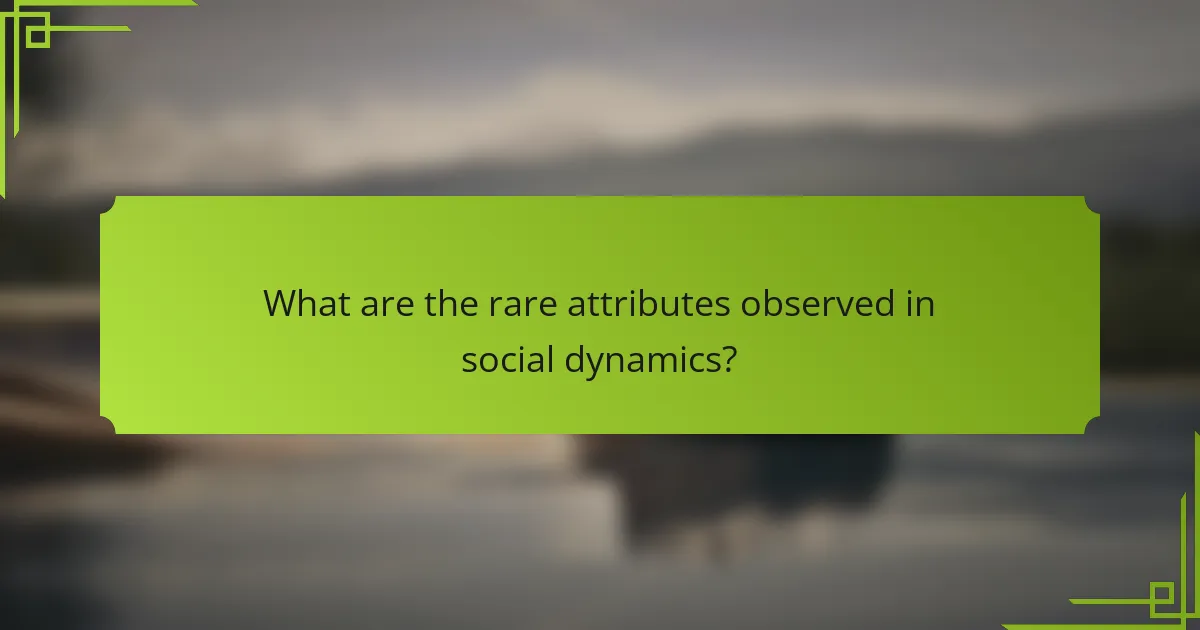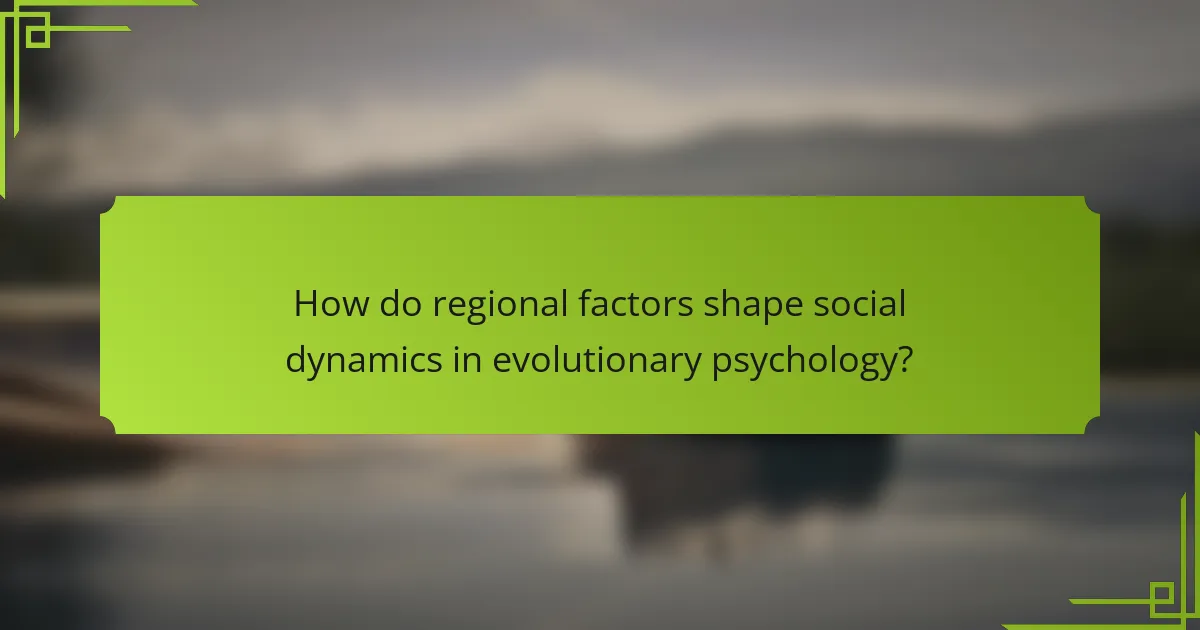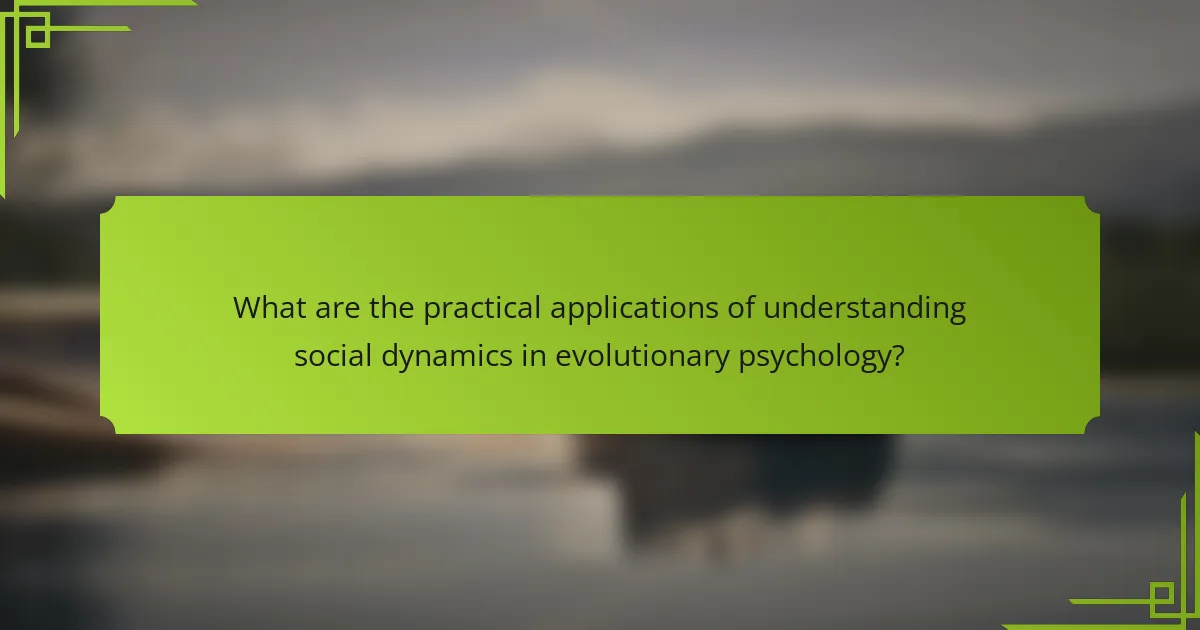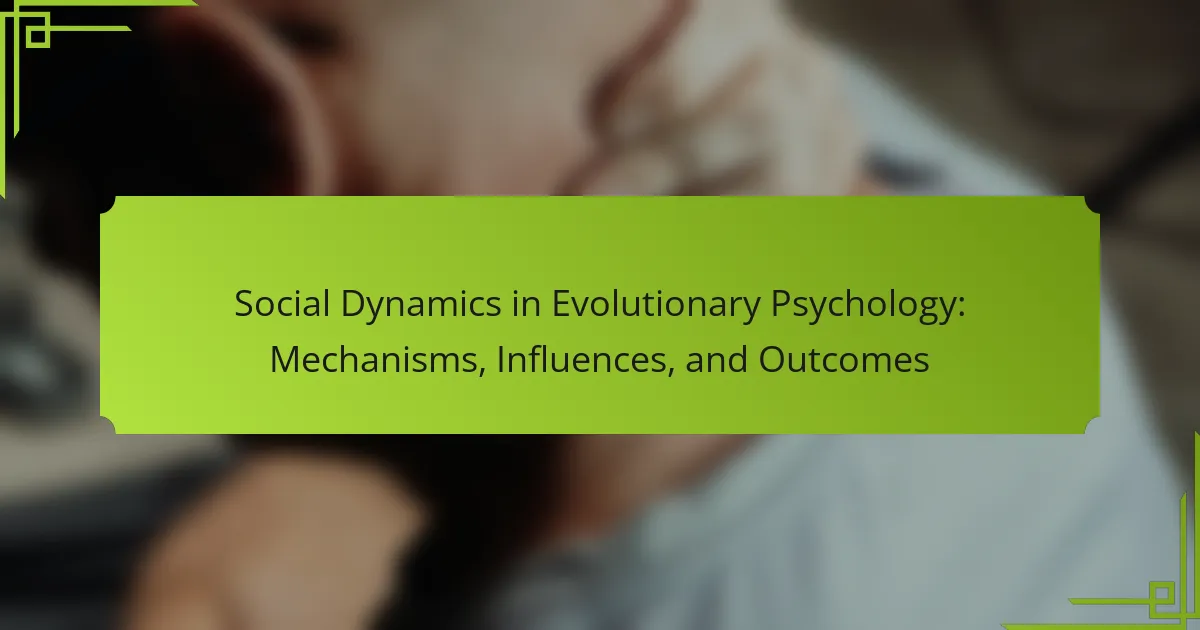Social dynamics in evolutionary psychology reveal how human interactions are shaped by mechanisms like kin selection, reciprocal altruism, and social learning. These mechanisms influence cooperation, competition, and social structures. Regional factors also play a crucial role in shaping behaviours and interactions. Understanding these dynamics has practical applications in fields such as marketing, education, and conflict resolution.

What are the core mechanisms of social dynamics in evolutionary psychology?
Social dynamics in evolutionary psychology are driven by mechanisms like kin selection, reciprocal altruism, and social learning. These mechanisms influence behaviour, cooperation, and competition, shaping social structures and cultural evolution. Kin selection emphasizes the survival of genetic relatives, enhancing group cohesion. Reciprocal altruism fosters cooperation among non-relatives, promoting mutual benefits. Social learning facilitates the transmission of knowledge and behaviours across generations, impacting societal norms and values. Understanding these core mechanisms reveals how evolutionary pressures shape human interactions and societal development.
How do social interactions influence evolutionary outcomes?
Social interactions significantly influence evolutionary outcomes by shaping behaviours and social structures. These dynamics foster cooperation, competition, and mate selection, impacting genetic diversity and adaptation. For instance, social bonding enhances group survival, while hierarchies can dictate reproductive success. As a result, species evolve traits that favour social cohesion, enhancing fitness in varying environments.
What role does cooperation play in social dynamics?
Cooperation is essential in social dynamics, facilitating group cohesion and enhancing survival. It fosters trust, promotes resource sharing, and supports collective problem-solving. In evolutionary psychology, cooperation influences social structures, leading to more complex interactions among individuals. This dynamic can enhance group success, as cooperation often results in improved outcomes for all members involved.
What are the evolutionary advantages of cooperation?
Cooperation offers evolutionary advantages by enhancing survival and reproductive success. It fosters resource sharing, increases group protection, and improves problem-solving abilities. These benefits lead to stronger social bonds and collective strategies that can adapt to changing environments. For instance, cooperative hunting in social animals boosts food acquisition, demonstrating a unique attribute of social dynamics. As a result, species that exhibit cooperation often thrive better than solitary counterparts.
How do competition and conflict shape social behaviour?
Competition and conflict significantly influence social behaviour by driving group dynamics and individual interactions. These mechanisms often lead to cooperation and social cohesion as individuals navigate competitive environments. For instance, competition can foster innovation and resourcefulness, while conflict may enhance group solidarity against external threats. Evolutionary psychology suggests that these behaviours are rooted in survival instincts, shaping social structures and relationships over time. Understanding these dynamics reveals how social behaviour adapts to environmental pressures, promoting both competition and collaboration within communities.
What are the evolutionary implications of competition?
Competition drives evolutionary change by influencing social dynamics, resource allocation, and survival strategies. It fosters adaptability among species, promoting traits that enhance fitness. For example, increased competition can lead to the development of cooperation strategies, as individuals seek alliances to improve their chances of survival. This interplay shapes social structures and behaviours, highlighting the unique attribute of cooperation as a response to competition. Additionally, competition can result in rare evolutionary traits, such as specialized adaptations that allow certain species to exploit niche environments. Understanding these implications reveals the complexity of evolutionary psychology and its impact on social dynamics.

What are the universal attributes of social dynamics in evolutionary psychology?
Social dynamics in evolutionary psychology involve universal attributes such as cooperation, competition, social learning, and group cohesion. These mechanisms influence individual behaviour and societal outcomes by shaping adaptive strategies. For example, cooperation enhances survival rates within groups, while competition drives innovation and resource acquisition. Understanding these attributes reveals insights into human behaviour and social structures.
How does social hierarchy affect group behaviour?
Social hierarchy significantly influences group behaviour by establishing roles and expectations. Higher-status individuals often lead decision-making processes, while lower-status members may conform to group norms. This dynamic can foster cooperation or competition, affecting group cohesion. Additionally, individuals in lower tiers may experience reduced agency, impacting their contributions. Social hierarchies can also shape communication patterns, with dominant members controlling discussions. Understanding these mechanisms helps clarify how group dynamics evolve over time.
What impact does social bonding have on survival and reproduction?
Social bonding significantly enhances survival and reproduction by fostering cooperation and resource sharing. Strong social ties improve group cohesion, which increases the likelihood of successful hunting and protection against predators. Additionally, social bonds facilitate mate selection and child-rearing, improving reproductive success. Studies indicate that species with strong social structures often exhibit higher rates of survival and greater reproductive outcomes.

What unique attributes define social dynamics in evolutionary psychology?
Unique attributes that define social dynamics in evolutionary psychology include kin selection, reciprocal altruism, and social learning. Kin selection emphasizes the importance of genetic relatedness in social behaviours. Reciprocal altruism highlights cooperation among non-relatives based on mutual benefit. Social learning allows individuals to acquire behaviours by observing others, enhancing adaptability in social contexts. These attributes shape how individuals interact, form alliances, and develop social norms, influencing overall group dynamics.
How do cultural factors influence social dynamics?
Cultural factors significantly shape social dynamics by influencing behaviour, norms, and group interactions. They create frameworks for communication and establish values that guide social relationships.
Cultural norms dictate acceptable behaviours, impacting how individuals interact within groups. For instance, collectivist cultures prioritize group harmony, affecting decision-making processes.
Language serves as a cultural tool that shapes social dynamics. It influences not only communication but also the perception of identity and belonging within a community.
Rituals and traditions reinforce social bonds, creating a sense of belonging. These practices can vary widely across cultures, showcasing unique attributes that define social structures.
What is the significance of altruism in social relationships?
Altruism significantly enhances social relationships by fostering trust and cooperation. It promotes prosocial behaviours that strengthen community bonds and improve group cohesion. Altruistic acts can lead to reciprocal relationships, where individuals support one another, enhancing overall social stability. Research indicates that altruism can also boost individual well-being, creating a positive feedback loop in social dynamics.

What are the rare attributes observed in social dynamics?
Rare attributes observed in social dynamics include unique social hierarchies, non-linear influence patterns, and emergent cooperation. These traits demonstrate how individual behaviours can lead to complex group interactions. For instance, certain social groups may exhibit unexpected alliances that defy traditional power structures. Additionally, factors like cultural context can create rare dynamics, influencing group cohesion and decision-making processes. Understanding these attributes enhances insights into social behaviour and evolution.
How do environmental changes impact social structures?
Environmental changes significantly reshape social structures by influencing group dynamics, resource allocation, and cultural adaptation. For instance, climate shifts can lead to migration, altering social hierarchies and community interactions. As a result, societies may develop new norms and practices to cope with environmental stressors. Unique attributes, such as technological advancements in response to environmental challenges, further differentiate how various cultures adapt. Understanding these mechanisms reveals the intricate relationship between environment and social evolution.
What are the effects of technological advancements on social interactions?
Technological advancements significantly reshape social interactions by facilitating communication and altering relationship dynamics. Digital platforms enable instant connectivity, fostering global interactions. However, these advancements may also reduce face-to-face engagements, impacting emotional connections. The unique attribute of online anonymity can lead to both positive and negative social behaviours. As a result, understanding these shifts is crucial for navigating modern social landscapes.

How do regional factors shape social dynamics in evolutionary psychology?
Regional factors significantly influence social dynamics in evolutionary psychology by shaping behaviours and interactions. Cultural norms, resource availability, and environmental conditions create unique social structures. For instance, societies in resource-rich areas may exhibit cooperative behaviours, while those in harsher environments might prioritize competition. These dynamics can affect mating strategies, group cohesion, and conflict resolution. Understanding these regional influences helps clarify how evolutionary pressures mould social behaviours across diverse populations.
What cultural variations exist in social behaviour across different regions?
Cultural variations in social behaviour manifest significantly across different regions. Factors such as collectivism versus individualism, communication styles, and social norms shape these behaviours. For instance, in collectivist cultures, group harmony is prioritized, while individualistic cultures emphasize personal achievement. Additionally, non-verbal communication varies; some cultures rely heavily on gestures, while others favour direct verbal interaction. Understanding these differences is crucial for effective cross-cultural communication and interaction.
How do local customs influence evolutionary psychology?
Local customs significantly shape evolutionary psychology by influencing social behaviours and adaptive strategies. These customs create unique environments that affect group dynamics and individual decision-making. For instance, communal practices may promote cooperation, enhancing group survival. Furthermore, the transmission of values through generations reinforces specific behaviours that align with local customs, leading to distinct psychological patterns. This interplay between culture and psychology exemplifies the rare attribute of localized adaptive strategies within evolutionary frameworks.

What are the practical applications of understanding social dynamics in evolutionary psychology?
Understanding social dynamics in evolutionary psychology has practical applications in various fields. It enhances interpersonal relationships by providing insights into human behaviour and social interactions. Professionals in marketing can utilize these insights to tailor campaigns that resonate with target audiences. In education, understanding social dynamics fosters better classroom environments by addressing group behaviours. Additionally, in conflict resolution, knowledge of social dynamics aids in mediating disputes effectively. These applications demonstrate the relevance of social dynamics in shaping human experiences and interactions across contexts.
What best practices can enhance social cooperation in groups?
Encouraging social cooperation in groups can be enhanced through clear communication, shared goals, and trust-building activities. Establishing a common purpose aligns individual efforts, fostering collaboration. Regular feedback and recognition promote a positive environment, reinforcing cooperative behaviours. Additionally, diverse perspectives can enhance problem-solving, creating a more inclusive atmosphere.
What common mistakes should be avoided in social interactions?
To enhance social interactions, avoid common mistakes that can hinder effective communication. One crucial error is failing to actively listen, which can lead to misunderstandings. Another mistake is making assumptions about others’ thoughts or feelings, which can create unnecessary conflict. Additionally, neglecting non-verbal cues can result in misinterpretations of intent. Lastly, dominating conversations without allowing others to contribute can alienate potential allies and friends.
How can insights from evolutionary psychology improve social relationships?
Insights from evolutionary psychology can significantly enhance social relationships by promoting understanding of human behaviour. Recognising innate social instincts, such as cooperation and competition, fosters empathy and improves communication. For example, understanding the evolutionary roots of jealousy can lead to more constructive conflict resolution. Additionally, awareness of social hierarchies helps individuals navigate complex social networks, enhancing collaboration and trust. Ultimately, applying these insights cultivates healthier, more resilient relationships.
